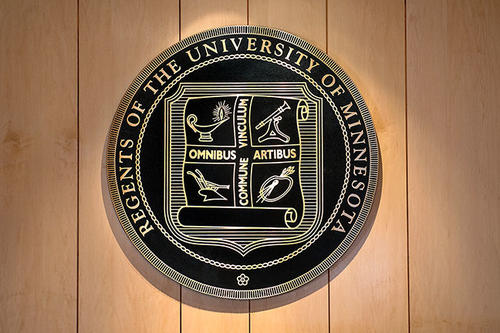
Driven to end hunger in our communities, University of Minnesota Duluth (UMD) Associate Professor Adam Pine’s research on “food deserts” helped lead to a new bus route to get residents of Duluth’s Lincoln Park neighborhood (a food desert) to the local grocery store.
Pine’s research is just one example of how UMD engages with the Duluth and Northeastern Minnesota to tackle critical issues, according to UMD Chancellor Lendley Black, who outlined the institution’s outreach efforts at today’s Board of Regents meeting on the Duluth campus.
“UMD is a critically important asset here, with an annual economic impact of more than a half-billion dollars on the entire Arrowhead Region, and our University system,” said Board Chair Dean Johnson. “We are Minnesota’s land-grant university, a mission we take seriously, this visit allowed us to further engage on topics of particular interest and importance to Duluth and Northeastern Minnesota.”
During the last year, UMD faculty, staff and students could be found:
- working directly with local companies to improve their energy efficiency and sustainability;
- supporting organic and sustainable food sourcing via The Sustainable Agriculture Project on the UMD Field Station;
- monitoring the cleanup of the St. Louis River Estuary;
- partnering with the mining industry to clean up water and soil and converting to more environmentally friendly processes;
- preparing 600 tax returns, totaling $600,000 in refunds, through the Volunteer Income Tax Assistance (VITA) program, which serves low and moderate-income residents; and
- receiving a federal grant from the U.S. Department of Health and Human Services to create a better delivery system for the Indian Child Welfare Act.
UMD is a key partner for business and industry in Northeastern Minnesota as well. The Center for Economic Development (CED) serves as a primary resource for entrepreneurs, actively engaging and assisting nearly 1,000 businesses mainly in the northern one-third of the state. CED also partnered with the Natural Resources Research Institute (NRRI) to provide expertise to encourage innovation and commercialization of new technology through the NRRI Business Assistance Fund.
With a focus on K-12 outreach, the Science on Deck program has proved popular. This initiative opens the Large Lakes Observatory’s Blue Heron research vessel is to children and adults for tours and opportunities to learn about science, water, and its impact on our lives. Nearly 600 individuals participated last summer. UMD is also a partner on the Boulder Lake Environmental Learning Center, a 18,000-acre outdoor classroom 18 miles north of Duluth and offers programming through the Marshall W. Alworth Planetarium and Charles L. Matsch portable GeoDome Theater.
Chancellor Black also highlighted the Bluestone development properties next to campus as a successful partnership among the University, City and private firm that brought a thriving retail and housing district close to campus.
Addressing rural and Native American health care needs
Another important aspect of the University’s land-grant mission is serving Minnesota’s rural and Native American health care needs.
In a work session on this topic, Regents began to help articulate a vision for the institution’s future health sciences presence in the state, where the University trains 70 percent of all working health professionals.
University leaders discussed current efforts across the six health sciences schools and more than 1,700 clinics statewide. This includes the Medical School’s Rural Physician Associate Program, which began in 1971, and Duluth campus, which opened a year later. In 2003, the College of Pharmacy added a Duluth campus to educate more pharmacists for Minnesota’s rural communities. Last year, a Medical Discovery Team focused on health equity, rural health access, and Native American health issues hired a nationally-renowned leader who is working on the Duluth campus.
Regents also:
Discussed the framework for the FY18 budget, including preliminary plans regarding tuition rates. Goals are to maintain a freeze for resident undergraduates on the Crookston, Duluth, Morris and Rochester campuses while limiting resident increases on the Twin Cities campus. The non-resident, non-reciprocity undergraduate rate on the Twin Cities campus would also increase, part of a planned move toward the middle of the Big Ten, with any raise being capped for current students.
Announced an independent review to assess the facts and processes related to recent events and actions regarding an incident involving a female student and members of the Gopher football team in fall 2016. The review will be led by the University’s Chief Auditor and is anticipated to be completed by May 2017.
Reviewed progress on system-wide strategic planning efforts. The goal of the plan is to develop a document that embraces the 21st century land-grant mission by articulating the common values, processes and expectations across campuses, and the contributions of the system to local, national and global communities. A draft is expected to be reviewed by the Board in May.
Heard from Student Representatives to the Board regarding student mental health, student data and free speech across the University system.
Appointed Linda Welage as the new dean of the College of Pharmacy. Welage, who comes from the University of New Mexico, Albuquerque, begins July 31.
Earlier this week, Regents toured the UMD campus, learned about research by faculty and students and hosted community leaders for a dinner at the Glensheen historic estate. Before that, they visited the the Cloquet Forestry Center and held a winter retreat.
Read the President’s report to the Board, including the announcement of the Land-Grant Legacy scholarship.
The Board will meet again May 11-12 at the McNamara Alumni Center on the Twin Cities campus. For more information, including meeting times and locations, go to the Regents website.
- Categories:
- Campus Affairs





